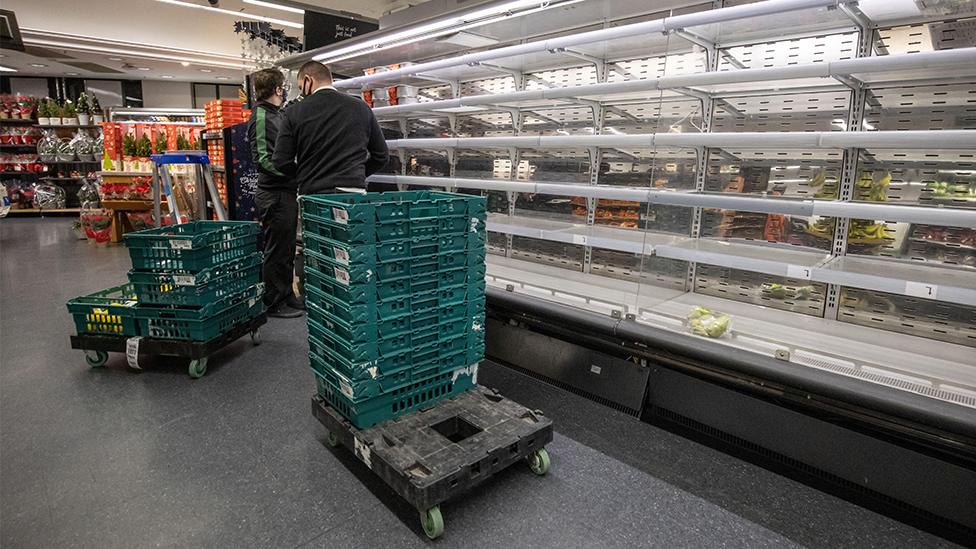Brexit: Stormont Parties divided on UK call to amend NI Protocol
- Published
- comments
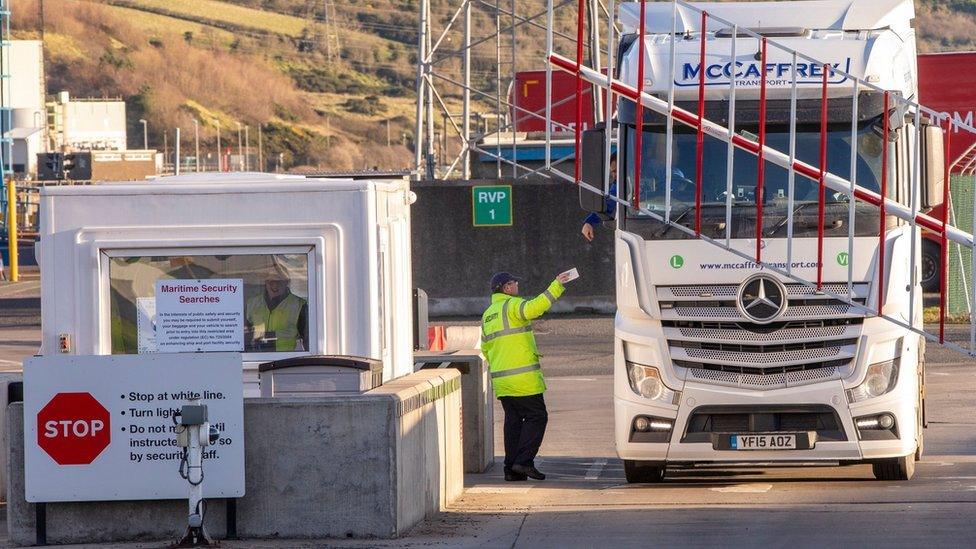
The protocol means some goods from Great Britain are now subjected to checks at Northern Ireland's ports
Northern Ireland's political parties are divided on calls by the government for the EU to begin negotiations to radically amend the Brexit protocol.
On Wednesday, Number 10 gave details of some proposals and said a new arrangement was urgently needed.
Unionist parties, which oppose the protocol, have welcomed the statement and urged the EU to engage.
But Sinn Féin, the SDLP and Alliance urged the government to agree a veterinary agreement to reduce checks.
The UK and EU agreed the Northern Ireland Protocol in 2019, as part of the Brexit withdrawal agreement.
It prevents a hard border in Ireland by keeping Northern Ireland in the EU single market for goods.
The UK says its implementation has been "unbalanced" and is "unsustainable" in its current form.
Brexit Minister Lord Frost said the full deal should not be implemented and called on the EU to look at new proposals with "fresh eyes".
His comments were welcomed by unionist parties in Northern Ireland, who have called for the protocol to be renegotiated as it is damaging Great Britain to Northern Ireland (GB-NI) trade and posing a risk to the union in its current form.
Democratic Unionist Party (DUP) leader Sir Jeffrey Donaldson said there was now a "tacit acceptance" from the government that the protocol is not working.
"Sticking plasters and short-term fixes were never going to work. We need a proper renegotiation," he said.
He criticised the EU and said Brussels had "failed to recognise the concerns of unionists".
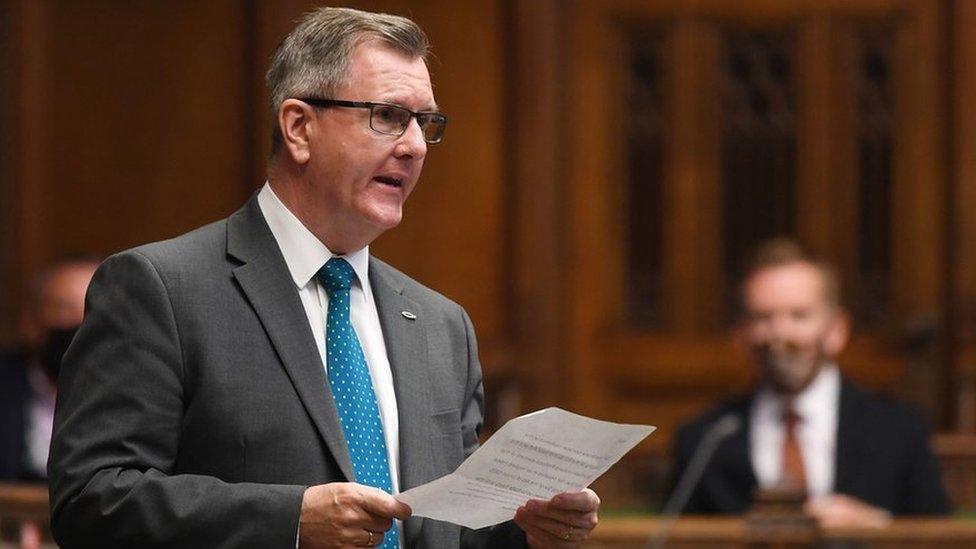
DUP leader Sir Jeffrey Donaldson wants the Northern Ireland Protocol renegotiated


The government has issued a 28 page command paper to accompany today's ministerial statements.
But it boils down to one simple sentiment: "Trust us."
They are telling the EU that it's single market can be protected without the panoply of checks and controls which currently apply to goods entering Northern Ireland from Great Britain.
They are suggesting this can largely be achieved through a light-touch, trusted trader scheme and new legislation to discourage smuggling.
Brexit veterans will recognise these as the sort of "alternative arrangements" suggested earlier in this process.
The EU was not persuaded then and with trust in short supply it will be a struggle to persuade them now.

The Ulster Unionist Party (UUP) leader Doug Beattie said he hoped Wednesday's statement would lead to "movement in the direction of finding pragmatic, workable solutions".
"I hope that the European Union will take their time in considering these proposals in good faith and will not reject them out of hand," he added.
The UUP leader will travel to Dublin on Thursday to meet the Taoiseach (Irish PM) Micheál Martin to make that case to him directly.
'A la carte approach'
Stormont's other main parties - Sinn Féin, the Social Democratic and Labour Party (SDLP) and Alliance - have said they recognise concerns about the protocol but that must be fully implemented in the absence of another arrangement.
Sinn Féin chairman Declan Kearney said the British government had agreed and ratified all elements of the protocol with the European Commission.
"It should now stop the evasion, and get on with it's implementation," he said.
"It is not acceptable for the Tories to adopt an a la carte approach towards the protocol, to rewrite history, and now attempt a renegotiation."
SDLP leader Colum Eastwood described the government's statement on Wednesday as a "shameless position based on political expedience rather than providing the stability that people, businesses and communities in Northern Ireland need".
He said he believed a resolution was still possible but would require the government to "step back from its bad faith interventions".
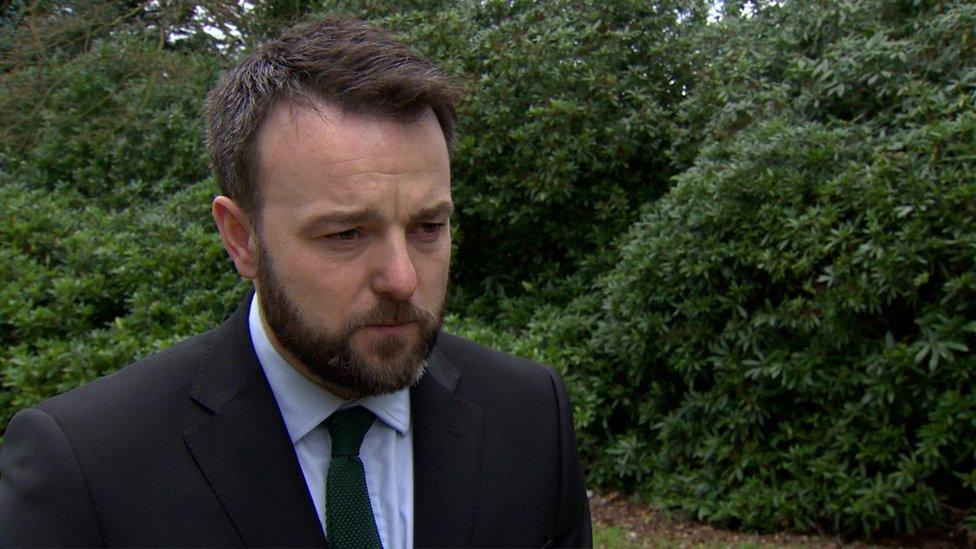
Colum Eastwood described the UK government's approach to the protocol as a "shameless position"
Alliance's deputy leader Stephen Farry also said the government was attempting to "rewrite history" and that their actions had undermined trust with the EU in finding sustainable solutions.
His party has supported suggestions from the EU for a temporary Swiss-style veterinary agreement as a way to reduce most checks on goods coming into Northern Ireland from Great Britain.
That would require the UK to follow all EU agri-food rules.
The UK said it is unwilling to cede control to the EU on this issue and is instead pushing for an equivalence arrangement in which the EU would recognise UK food production standards as being equivalent to its own.
'Trust in short supply'
Simon Hoare, chairman of Westminster's Northern Ireland Affairs Committee, described the UK's new proposals for the protocol as an "interesting approach".
"If there is to be any chance of change, mutual and binding trust will be the key currency. I am fearful that this is in short supply and needs to be worked on energetically and now.
"Common sense and pragmatism must not be a dirty word for either side," Mr Hoare added.
Earlier, Ireland's Europe minister, Thomas Byrne, said "there can be no renegotiation of the [NI] protocol".
But he added that the arrangement had its complications, and said Irish government is "willing to discuss any creative solutions within the confines of the protocol".
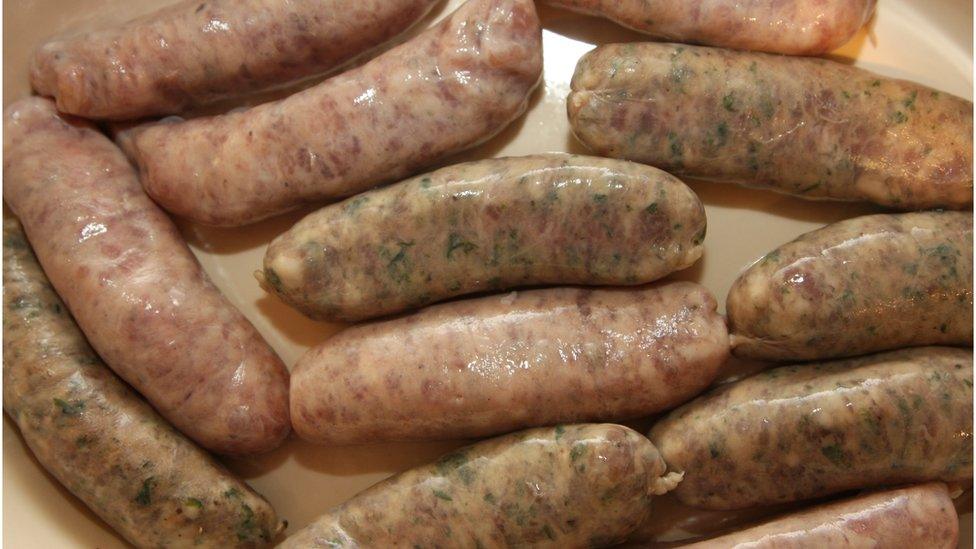
The EU has strict rules about the importation of chilled meat products like mince and sausages
Ahead of the publication of the UK paper, the chairman of Marks & Spencer Archie Norman warned of the impact of full protocol checks on fresh foods when grace periods end this autumn.
"This Christmas, I can tell you already, we're having to make decisions to delist product for Northern Ireland because it's simply not worth the risk of trying to get it through," he said.
Mr Norman called for a "common sense" solution to post-Brexit problems at his firm's stores on the island of Ireland.
The M&S said the level of checks and controls are "very threatening" to Marks and Spencer's Irish business.
He suggests the easiest solution would be to "agree a time limited veterinary/food standards agreement".
Speaking on Radio 4 on Wednesday morning, Mr Norman said the problems his company has faced exporting to the Republic of Ireland are likely to be replicated in Northern Ireland by the autumn.
"At the moment only about 80% of our product is getting into [the Republic of] Ireland - so 20% doesn't arrive at all," he said.
"It's not the rules of the Customs Union that is the problem, it's the Byzantine and pointless and honestly pettifogging enforcement which means that wagons can't get through."
Vets for sandwiches
He said trucks had been turned away on the basis of the wrong colour of typeface used on documents.
"We're employing 13 full-time vets who are not looking after animals or welfare, they're simply ticking boxes and filling out forms," he added.
"Sandwiches typically require about three vets' certificates to get through.
"Come October our experience in southern Ireland is probably, as it currently stands, set to be replicated in Northern Ireland."
Related topics
- Published21 July 2021
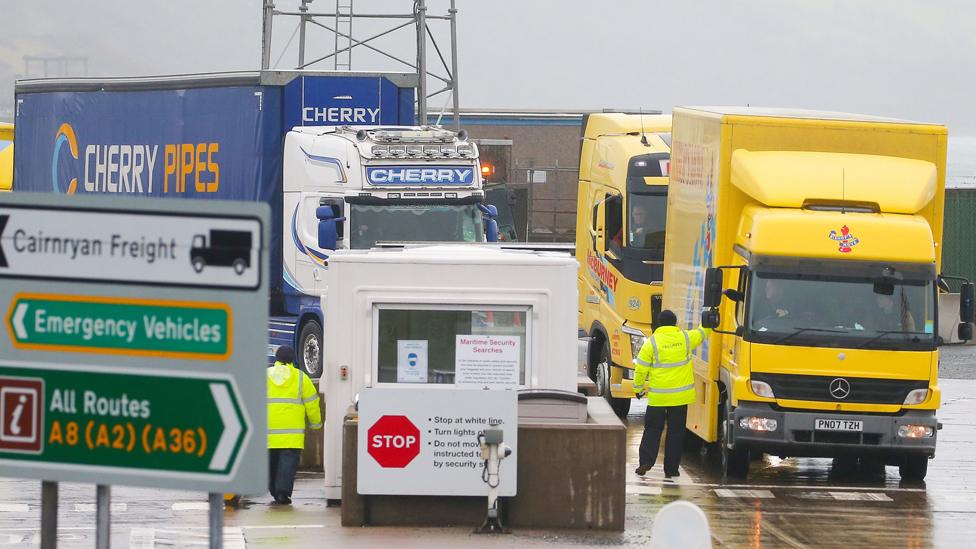
- Published2 February 2024

- Published18 July 2021
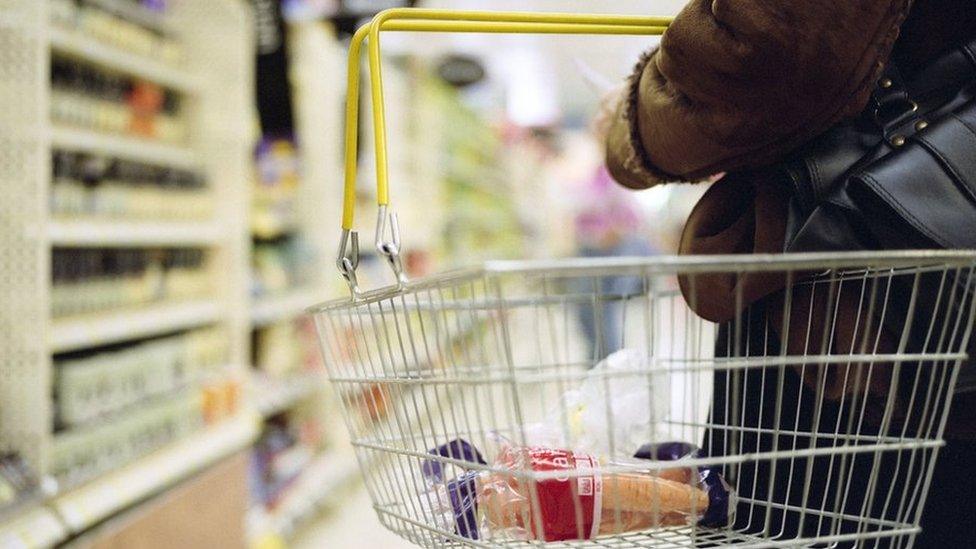
- Published16 July 2021
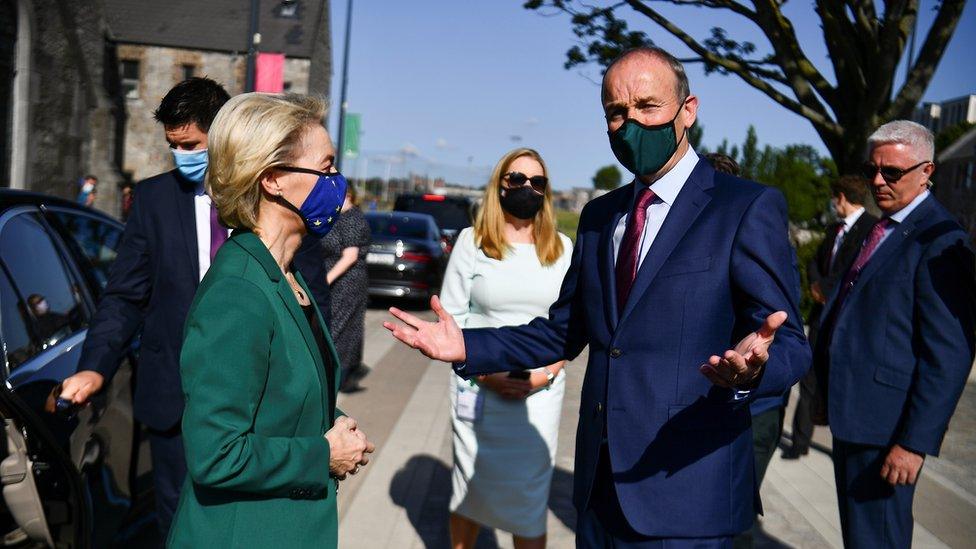
- Published8 July 2021
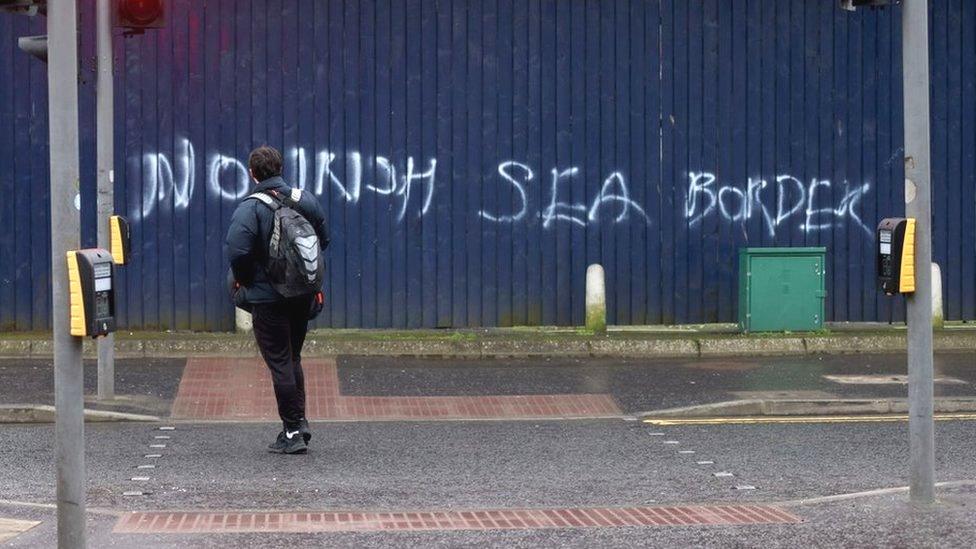
- Published21 July 2021
